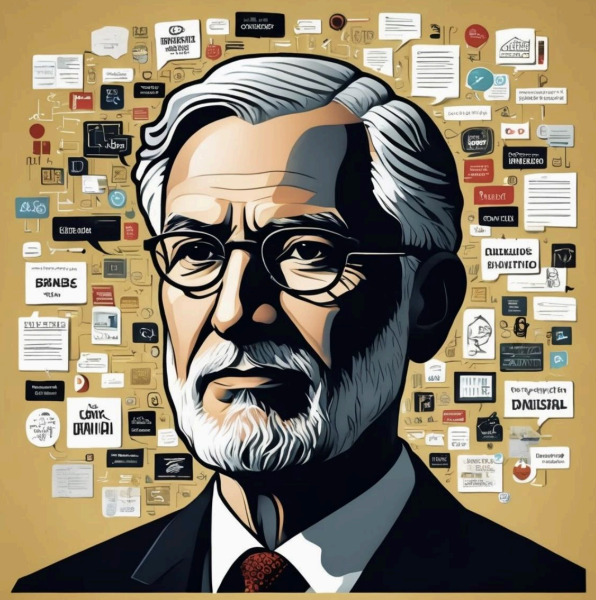Yuri Bezmenov
Yuri Alexandrovich Bezmenov (alias Tomas David Schuman) was one of the
most prominent KGB defectors and a leading analyst of Soviet subversion
strategies. His work, long marginalized, has recently regained significant
relevance. He was born on December 11, 1939, in Mytishchi, near Moscow,
into a family of senior officers and intellectuals. His father, a high-ranking
officer of the Red Army, was responsible for inspecting Soviet troops abroad,
notably in Mongolia and Cuba.
At the age of seventeen, Bezmenov entered the Moscow Institute of Oriental
Languages, where he specialized in Hindi, literature, history, and Indian music.
There, he received both diplomatic and military training, including strategic
cartography and the interrogation of prisoners — preparing future agents for
influence operations abroad. After graduating in 1963, he was sent to India as
a translator and public relations officer for Soviet refinery projects. It was there
that he closely observed the methods of cultural and political penetration used
by the Eastern Bloc.
In 1965, Bezmenov joined the Novosti Press Agency (APN), a media front for
the KGB. According to his own account, about 75% of Novosti’s staff were
KGB officers or direct collaborators. There, he mastered the art of
disinformation: writing propaganda articles, organizing trips for foreign
influencers, manipulating media narratives, and infiltrating intellectual circles.
In 1969, he returned to India as press attaché at the Soviet embassy,
continuing his propaganda and espionage activities.
During this second stay in New Delhi, he became fully aware of the corruption,
brutality, and inefficiency of the Soviet system. He then began to carefully plan
his defection. In 1970, taking advantage of a tourist trip, he disguised himself
as a hippie, evaded KGB surveillance, and sought refuge with American
authorities. He was later exfiltrated to Canada under an agreement between
U.S. and Canadian intelligence services.
Settling in Montreal under the name Tomas David Schuman, he became a
journalist, lecturer, and author. He collaborated with Canadian media, but his
identity was soon exposed by the Soviet press, depriving him of Western
protection and exposing him to potential KGB reprisals. Despite a life marked
by solitude and financial hardship, he launched an extensive campaign to
raise awareness about the mechanisms of ideological subversion.
Bezmenov published several works, including Love Letter to America, No
Novosti Is Good News, World Thought Police, and Black Is Beautiful,
Communism Is Not. He delivered numerous lectures, particularly in the United
States, and in 1984 gave a widely discussed interview to G. Edward Griffin.
Rediscovered and circulated widely on the Internet after 2013, this interview
brought him unexpected posthumous fame.
His most influential analysis concerned the KGB’s strategy of ideological
subversion — a slow, methodical process aimed at destabilizing Western
societies without resorting to armed force. According to Bezmenov, 85% of the
KGB’s resources were devoted to psychological warfare, disinformation, and
manipulation, while only 15% were used for traditional espionage. He
identified four stages:
- Demoralization – over 15 to 20 years: destruction of values, erosion of
trust in institutions, infiltration of media, education, and cultural elites. - Destabilization – over 2 to 5 years: creation of economic, political, and
social crises, and exacerbation of internal divisions. - Crisis – the breaking point, often marked by violence, uprisings, or the
collapse of state structures. - Normalization – the establishment of a new authoritarian regime under
the pretext of restoring order, consolidating foreign influence.
Bezmenov emphasized that subversion does not aim to convert but to confuse
— to make society incapable of distinguishing truth from falsehood, and
therefore vulnerable to manipulation. He warned Western elites, whom he
called the “useful idiots” of the Soviet system, against the danger of
democracy being undermined from within by ideology and disinformation.
Although often dismissed as alarmist and even marginalized by Western
intelligence services during his lifetime, Bezmenov is now frequently cited in
discussions on disinformation, political polarization, and cognitive warfare. His
lectures have been featured in documentaries, academic studies, and even
popular culture, including the video game Call of Duty.
Yuri Bezmenov died in Montreal on January 5, 1993, in anonymity and
poverty. His legacy, long overlooked, has become an essential reference for
understanding the modern dynamics of mass manipulation, the fragility of
open societies, and the enduring power of ideological subversion strategies
inherited from the Cold War.
Paul-Michel Manandise



